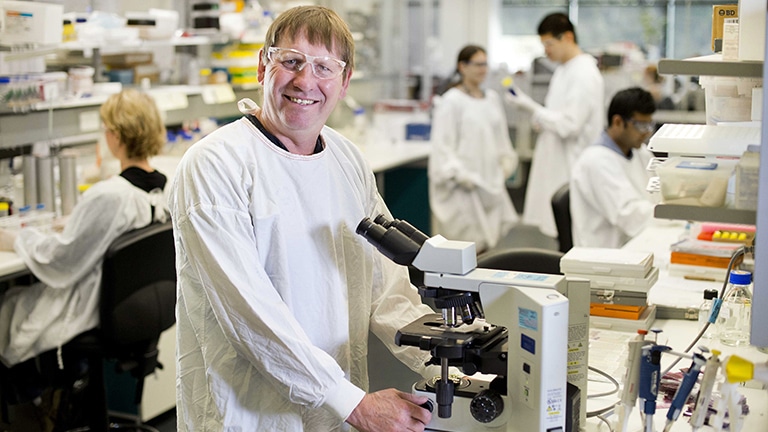
Hunter researchers have discovered a protein that induces both stiffening and inflammation in the airways of the lung, causing severe and chronic respiratory illness.

Hunter researchers have discovered a protein that induces both stiffening and inflammation in the airways of the lung, causing severe and chronic respiratory illness.
Called Fibulin-1c, the protein is believed to be a key factor in collagen build-up for patients suffering asthma, Chronic Obstructive Pulmonary Disorder (COPD) and a rarer but deadly disease known as Idiopathic Pulmonary Fibrosis (IPF).
“Airway fibrosis, where you get collagen deposits around the airways, is a common feature with all three diseases. It makes the airways stiffer and reduces the ability to breathe,” lead researcher Professor Phil Hansbro, from the University of Newcastle, said.
“It’s not really known why this stiffening occurs but we’ve discovered that an increase in the Fibulin-1c protein occurs during the later and more severe stages of disease progression.”
The Hunter research team, including PhD student Gang Liu, collaborated with scientists in Sydney and the Netherlands on human work and with South Carolina who had developed an experimental model with the Fibulin-1C isoform genetically eliminated.
They aligned this with Hunter-based models of chronic asthma, COPD and IPF and found there was complete protection against airway fibrosis. The results have just been published in the international clinical journal JCI Insight.
Professor Hansbro said the findings were confirmed in broader modelling after the team developed an RNA inhibitor that binds to the Fibulin-1c gene and stops it working.
“Collagen consists of various different extra-cellular matrix [ECM] proteins, one of which is Fibulin-1c,” he explained. “In the absence of Fibulin-1c, the other ECM proteins were also diminished so we think that Fibulin-1c may be the scaffold for collagen construction”.
“What we also discovered – and we don’t know why this happens yet – is that inhibiting Fibulin-1c also protected against airway inflammation. This was unexpected because there’s never been a role shown for this protein in the immune response, for COPD particularly.”
Professor Hansbro says the next step is to develop inhibitors to prevent over-stimulation of Fibulin-1c in earlier disease stages. This could stop the onset of fibrosis.
“At the moment these are major clinical concerns because people with severe asthma don’t respond to treatments. There’s no effective treatment for COPD, and IPF is ultimately fatal.”
HMRI would like to acknowledge the Traditional Custodians of the land on which we work and live, the Awabakal and Worimi peoples, and pay our respects to Elders past and present. We recognise and respect their cultural heritage and beliefs and their continued connection to their land.

Hunter Medical Research Institute
We’re taking healthy further.
Locked Bag 1000
New Lambton
NSW, Australia, 2305



This site is protected by reCAPTCHA and the Google Privacy Policy and Terms of Service apply.
Copyright © 2024 Hunter Medical Research Institute | ABN: 27 081 436 919
Site by Marlin Communications
